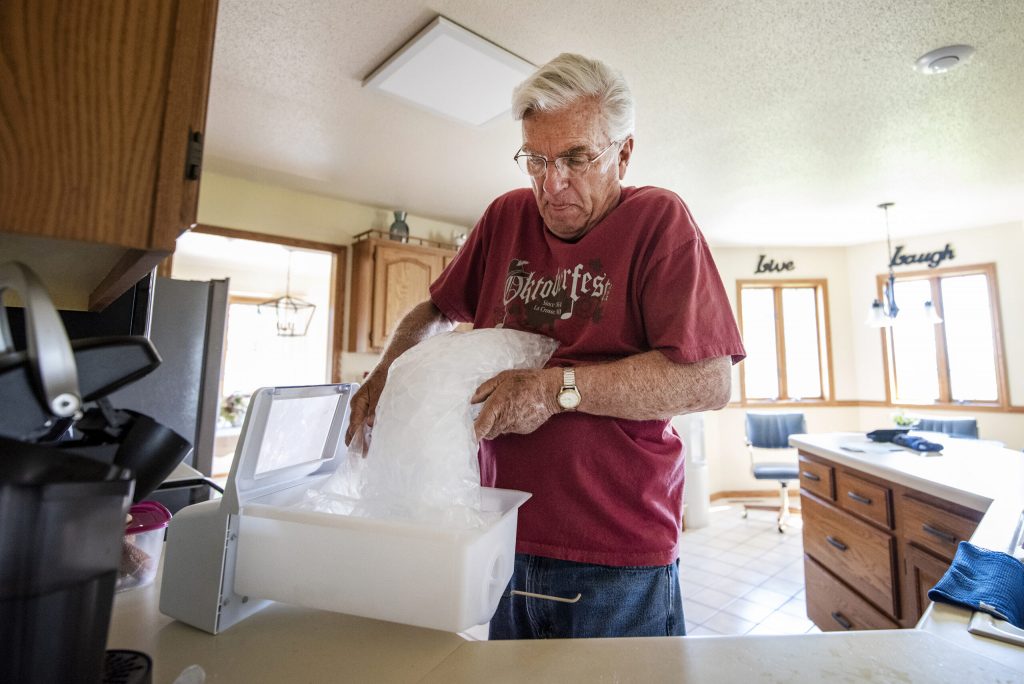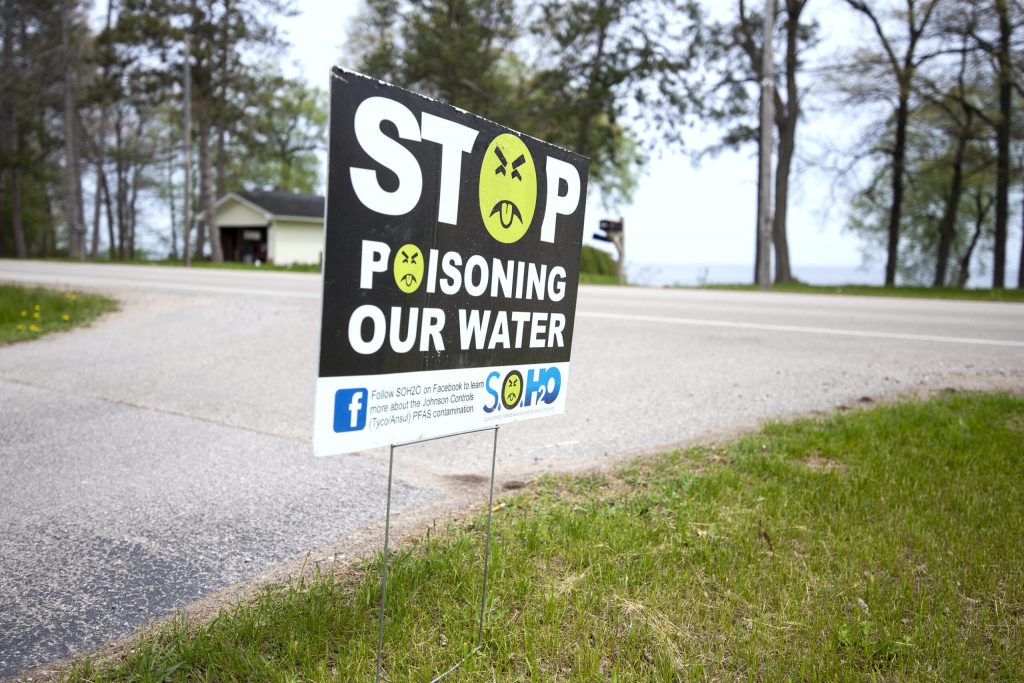State Appeals Court Blocks DNR’s Regulation of PFAS
2-1 decision upholds lower court ruling limiting agency's authority to clean up PFAS.
A state appeals court has upheld a lower court ruling that deals a blow to state environmental regulators’ authority to force businesses to clean up PFAS pollution under Wisconsin’s spills law.In a 2-1 decision Wednesday, a three-judge panel said policy changes by the Wisconsin Department of Natural Resources that require participants under a voluntary cleanup program to test for and address PFAS do not comply with state law.
The decision affirmed a Waukesha County circuit court judge’s ruling in favor of Wisconsin Manufacturers and Commerce, or WMC. That decision, issued nearly two years ago, stated regulators must first list PFAS as hazardous substances through the state’s rulemaking process.
The ruling could have far-reaching implications for the DNR’s ability to address PFAS contamination in groundwater. Since the lawsuit was first filed, the state has passed standards for the chemicals in drinking water and surface water, but there are still no state standards for the chemicals in groundwater.
The Department of Justice represented the DNR in the case. Wisconsin Attorney General Josh Kaul said the agency will appeal the decision to the Wisconsin Supreme Court.
“This would undermine our ability in Wisconsin to protect safe and clean drinking water,” Kaul told WPR. “We can’t let that happen at a time that we’re facing emerging contaminants like PFAS.”
A prior hold on the lower court ruling remains in effect. If the decision were allowed to stand, the DNR would have to wait on legislation from lawmakers that would allow the agency to continue crafting regulations for PFAS in groundwater — a process that can take years. The agency was forced to abandon its proposed groundwater standards in December due to excessive compliance costs. Around one-third of state residents rely on private wells that draw from groundwater.
Both Republicans and Democrats in the Legislature have bills that would allow the agency to continue its work, but the proposals appear to be dead for this legislative session. The Assembly held its last scheduled floor session in February.
Multiple studies of people living and working in areas with high PFAS levels have shown links to serious health effects that include increased risk of kidney and testicular cancers, thyroid disease, fertility issues and reduced effectiveness of vaccines.
The appeals court decision is a win for WMC, which filed a lawsuit against the state DNR, the agency’s secretary and its policy-making board in 2021. The business group was joined in the suit by Oconomowoc-based dry cleaner Leather Rich.
They argued the DNR lacked explicit authority to require the business to address PFAS pollution under its cleanup programs without standards for the chemicals.
In the suit, the groups argued the DNR bypassed the state’s rulemaking process as part of issuing an interim policy under a voluntary cleanup program that required participants to test for PFAS and address contamination. They said that forced the owner, Joanne Kantor, to invest more than $235,000 toward cleaning up the property, delaying her retirement in order to offset the cost of the investigation.
In Wednesday’s decision, the appeals court sided with WMC.
“Because the DNR did not promulgate this rule in accordance with the required rulemaking procedures, the circuit court did not err in concluding that the interim decision is invalid and therefore unenforceable,” Judge Shelley A. Grogan wrote for the majority.
Judge Lisa S. Neubauer dissented in the ruling.
“Today, for the first time since the statute was enacted, the court holds that the DNR must promulgate rules identifying certain substances as hazardous before the Spills Law applies to discharges of those substances,” Neubauer wrote.

Dale Wetterling empties a bag of ice into a box before placing it in the freezer Tuesday, June 1, 2021, at his home in French Island, Wis. He and his wife, Mary, use ice from Kwik Trip due to PFAS contamination in their water. Angela Major/WPR
Environmental groups said the case undermines more than 40 years of protections under the state’s spills law, limiting the agency’s ability to force polluters to clean up contamination.
Midwest Environmental Advocates, or MEA, filed a brief in the case on behalf of environmental and public health advocates, as well as a local leader of a PFAS-contaminated community. MEA Staff Attorney Rob Lee said they’re disappointed with the ruling.
“We are confident that the DNR’s efforts to keep Wisconsin families safe from PFAS contamination will ultimately be vindicated,” Lee said in a statement. “In the meantime, a stay on the decision is in effect, which will limit the harm suffered by those living in and around PFAS contamination sites in Wisconsin until this case is ultimately resolved.”
Just last month, the Environmental Protection Agency proposed listing nine PFAS as hazardous substances under the Resource Conservation and Recovery Act. The agency has yet to finalize national standards for a slate of six chemicals in drinking water.
The decision comes as Republican lawmakers and Democratic Gov. Tony Evers are at odds over a GOP bill to address PFAS contamination that would limit the DNR’s authority to test for and clean up the chemicals.
The legislation sponsored by Green Bay Republican Sens. Eric Wimberger and Rob Cowles would prevent the DNR from taking enforcement action against people deemed “innocent landowners” as long as they let the agency clean up the chemicals at the state’s expense. The bill also requires the DNR to seek permission from landowners to test for PFAS, and it limits the agency’s ability to require testing unless the DNR has probable cause to believe PFAS levels would exceed state or federal standards. Evers has said he will veto the bill.
He offered a compromise for spending $125 million set aside under the current budget to help local governments and landowners address PFAS pollution, but GOP lawmakers have signaled they’re not interested in his offer. Communities and landowners have been waiting for months for financial aid, and they could be forced to wait even longer without a deal or action from the Legislature’s powerful budget-writing committee.
State appeals court upholds ruling that DNR lacks broad authority to regulate PFAS was originally published by Wisconsin Public Radio.
If you think stories like this are important, become a member of Urban Milwaukee and help support real, independent journalism. Plus you get some cool added benefits.
More about the PFAS Problem
- PFAS Levels in Great Lakes Fish Are Dropping - Danielle Kaeding - Feb 6th, 2026
- Gov. Evers and GOP Lawmakers Near a Deal on PFAS Pollution - Danielle Kaeding - Jan 22nd, 2026
- Gov. Evers Optimistic About Reaching Final Deal With Republican Lawmakers to Secure Release of $125 Million in Long-Awaited Pfas Investments - Gov. Tony Evers - Jan 21st, 2026
- Bipartisan Push to Tell Counties Faster When Water Tests Fail - Henry Redman - Dec 19th, 2025
- MKE County: County Seeks to Sue PFAS Producers, Oil Companies - Graham Kilmer - Dec 10th, 2025
- Wisconsin Reviewing EPA-Approved Pesticides For PFAS - Danielle Kaeding - Dec 9th, 2025
- State Nears Settlement with Johnson Controls/Tyco Over PFAS Spills - Danielle Kaeding - Dec 4th, 2025
- Senate Bill Promotes Soybean-Based Firefighting Foam to Replace PFAS - Danielle Kaeding - Dec 2nd, 2025
- Test Results Show High PFAS Levels in Wisconsin’s Landfill Runoff - Danielle Kaeding - Dec 2nd, 2025
- Wisconsin Communities Get $282 Million for Drinking Water Projects - Danielle Kaeding - Nov 19th, 2025
Read more about PFAS Problem here






















